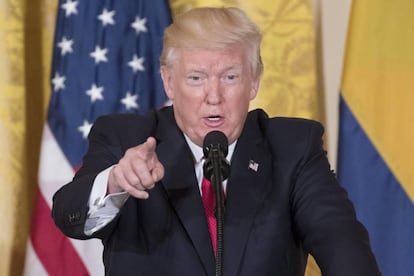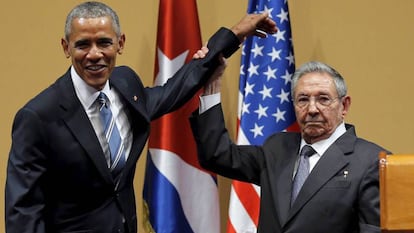In a first, Cuba loses patience with Trump’s “ridiculous” statements
US president criticizes regime on Independence Day; Havana chides “millionaire-tycoon-turned-president”

For the first time, the Cuban government has responded to US President Donald Trump in an exasperated tone. On Saturday, when the island nation was observing the anniversary of the creation of the Republic of Cuba on May 20, 1902, the White House released a statement from Trump “to the Cuban-American community and to the people of Cuba” stating that historical figures such as the Cuban patriot José Martí “remind us that cruel despotism cannot extinguish the flame of freedom in the hearts of Cubans.”

“The Cuban people deserve a government that peacefully upholds democratic values, economic liberties, religious freedoms, and human rights, and my Administration is committed to achieving that vision,” reads the statement.
Just hours later, Cuban television aired a reply that derided Trump’s message as “ridiculous” and “ill-advised.” Cuban authorities criticized “the contradictory, blundering statements by the millionaire-magnate-turned-president on matters of foreign and domestic policy.”
This recent verbal scuffle could set the tone for a future relationship defined by an ill-humored pragmatism
Up until now, the Raúl Castro administration had exercised self-restraint in the face of Trump’s criticism. This verbal clash is the first direct falling out between both countries since the new US president took office, and it represents a harsh change of tone in bilateral relations following the diplomatic normalization that began in December 2014 under then-president Barack Obama.
Under Trump, who has spoken – both before and after his election victory – of the possibility of backtracking on his predecessor’s overtures to Cuba if Havana did not respect civil liberties, bilateral relations have entered a period of unease until the White House defines its Cuba policy.

Cuban-American political power, which remains loyal to Miami exiles’ traditional demands for Washington to be tough on Havana, is pressuring the president in this direction, although his administration is not expected to go much further than verbal political denunciation and the odd minor corrective measure. This is because half of all Cuban-American voters support a normalization of relations, and because there is significant US business interest in continuing with the thaw.
This recent verbal scuffle could set the tone for a future relationship defined by an ill-humored pragmatism under which both governments would direct barbs at one another but make no politically significant moves – or it could herald a regression to the days of open hostility that could eventually have real political repercussions.
English version by Susana Urra.
Tu suscripción se está usando en otro dispositivo
¿Quieres añadir otro usuario a tu suscripción?
Si continúas leyendo en este dispositivo, no se podrá leer en el otro.
FlechaTu suscripción se está usando en otro dispositivo y solo puedes acceder a EL PAÍS desde un dispositivo a la vez.
Si quieres compartir tu cuenta, cambia tu suscripción a la modalidad Premium, así podrás añadir otro usuario. Cada uno accederá con su propia cuenta de email, lo que os permitirá personalizar vuestra experiencia en EL PAÍS.
¿Tienes una suscripción de empresa? Accede aquí para contratar más cuentas.
En el caso de no saber quién está usando tu cuenta, te recomendamos cambiar tu contraseña aquí.
Si decides continuar compartiendo tu cuenta, este mensaje se mostrará en tu dispositivo y en el de la otra persona que está usando tu cuenta de forma indefinida, afectando a tu experiencia de lectura. Puedes consultar aquí los términos y condiciones de la suscripción digital.








































